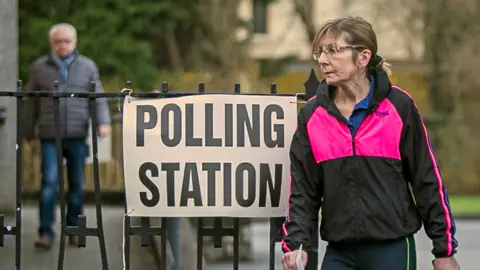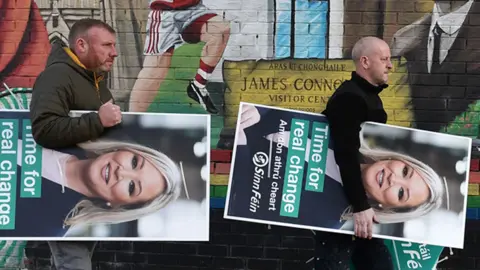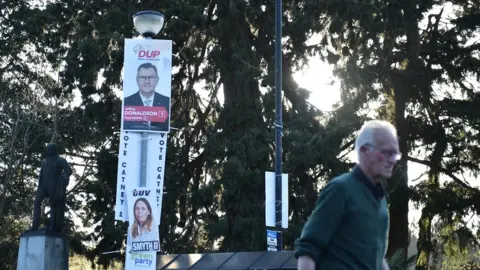Election 2022: Is Northern Ireland headed for a seismic shift?
 PA Media
PA MediaMuch to the frustration of some in Northern Ireland, there can often be a feeling that politics here is of little consequence to the rest of the UK.
After all, this wee place has completely different political parties from the main players at Westminster, not to mention a history of armed conflict which has created a very different political culture.
But things are changing. These elections could deliver a significant outcome for the whole of the UK. For the first time in Northern Ireland's 100-year existence, a nationalist party - Sinn Féin - may become the largest party.
Sinn Féin's ultimate goal is for Northern Ireland to leave the UK and become one country with the Republic of Ireland.
"This is the most important election in our history," says Jeffrey Donaldson, the leader of the Democratic Unionist Party (DUP), Sinn Féin's long-time, bitter opponents at the ballot box.
But a victory for Sinn Féin doesn't mean a border poll would be imminent. There are plenty of voters who may aspire to have one, but believe it would be too divisive right now.
That said, a Sinn Féin victory would bring more prominence and renewed energy to their campaign. It would also be a historic tipping point in a place which is still going through a delicate peace process, and could lead to months of political uncertainty.
With the Scottish National Party already in power in Scotland, having two parts of the UK with ardent nationalists as the largest parties would also create the image of a United Kingdom that has never looked less united.
Symbolic blow
The Good Friday agreement in 1998, which ended decades of violence in Northern Ireland, created a system in which the largest unionist and nationalist parties must govern together - but who won the most seats has always mattered.
A unionist party has always been returned as the largest party at Stormont, giving some reassurance to people who strongly see themselves as British and want remain part of the UK.
 Getty Images
Getty ImagesIf Sinn Féin are the largest party, they would be entitled to fill the post of first minister, a major symbolic blow to unionists, even though the first minister and deputy, must govern together in equal partnership.
Sinn Féin was once known as the political wing of the armed paramilitary group the IRA, during the 30 years of armed conflict known as the Troubles. It stirs up deep emotions for those who remember.
On the Shankill Road, a loyalist area with shop windows adorned with union flags ahead of the Queen's Jubilee, a man says under his breath: "I still don't trust them as far as I can throw them."
But Northern Ireland is a very different place now. So what is behind this potentially seismic shift?
Brexit has brought big problems for the DUP, the largest unionist party. Some unionists are angry that Prime Minister Boris Johnson agreed the Northern Ireland protocol, part of the Brexit deal which created a new trade border down the Irish sea.
They see this as a betrayal that threatens to erode Northern Ireland's place in the UK, a step closer to a united Ireland that must be fiercely resisted.
That anger has led to the DUP losing votes to an even more hardline party, the Traditional Unionist Voice (TUV), which uses even more ferocious language to depict what they see as the dangers for unionists of the Brexit arrangements.
"If we do not kill the protocol, it will kill the union," TUV leader Jim Allister told a recent protest rally.

- WHO SHOULD I VOTE FOR? How the Northern Ireland parties compare
- POSTCODE SEARCH: Is there an election in my area?
- WHAT'S HAPPENING WHERE? Really simple guide
- ELECTION ALERTS: Sign up for Northern Ireland election alerts

The problem for the DUP is that they are also losing voters in the other direction too. Many people are increasingly fed up with so-called Green and Orange politics - green for those who want Irish unification, orange which has become shorthand for unionism, referring to the unionist organisation the Orange Order.
Moderate unionists in particular are voting in larger numbers for centre-ground parties who do not align themselves with either. The cross-community Alliance party has seen a sharp rise in its vote share in recent elections, and could become the third biggest party in the assembly ahead of the other two traditional parties, the Ulster Unionist Party and the nationalist SDLP.
And frustration with perpetual "crisis politics" at Stormont is another factor. The uneasy forced coalition between unionists and nationalists since the Good Friday Agreement is fragile and has often collapsed.
"At least you're running better than Stormont," reads a sign held up to spur on competitors at the recent Belfast marathon.
For three of the past five years there was no assembly, after Sinn Féin pulled out. This year the DUP pulled out of the executive over the Brexit arrangements.
It leaves Northern Ireland in limbo, and public services stagnating without the ability to agree updated budgets and allocate millions of extra funding.
Voters moving to cross-community parties like Alliance and the Greens, will often tell you they just want to see an end to the system where one side can bring the whole house down.
Mood change
Unfortunately for them, there is likely to be more uncertainty after the votes are counted - the DUP says it will not return to the executive unless the new checks on goods over the Irish Sea are removed.
Polling research shows the splintering of the DUP vote is a major reason for Sinn Féin's potential success.
"The unionist community have increasingly moved away from political unionist parties, so there has been a mood change that has taken place within unionism," Peter Shirlow, from the Institute of Irish Studies at Liverpool University, explains.
"If the DUP does badly, it's a unionist political crisis, not a constitutional crisis."
If Sinn Féin was to emerge as the largest party, it would be quite some journey for a party whose former leader was at one time not even allowed to have his voice heard on television - instead Gerry Adams' words would be spoken on the news by an actor.
 Getty Images
Getty ImagesMr Adams always insisted he was not in the IRA, which was always met with great scepticism. Sinn Féin's current leader Michelle O'Neill, unlike her predecessor Martin McGuinness, does not have an IRA past, and she represents the newer face of the party.
"Once they moved away from violence and appeared to fully embrace politics, you could see the Sinn Féin vote escalating quite quickly," says Allison Morris, a political commentator who writes for the Belfast Telegraph. "I think that there's enough space now between the conflict and Sinn Féin."
Under O'Neill's leadership, Sinn Féin has not put calls for a unification vote front and centre of its campaign, focusing instead on everyday issues like the cost of living. But there is deep suspicion among many unionists that Sinn Féin would revert to pushing for a border poll more prominently if they won.
"Sinn Féin's top priorities in this election are tackling the cost of living crisis and supporting the health service," O'Neill said at their manifesto launch.
While the DUP remains very socially conservative, opposed to abortion and same-sex marriage, Sinn Féin has had more success in appealing to younger voters, for example changing its policy to allow women access to abortions.
"It feels like progress to someone like me," says Ryan Jennings, a young voter I meet on the Falls Road, not far from Sinn Féin's Northern Ireland HQ.
We scroll through Sinn Féin's social media feed, and spot Gerry Adams dancing to an old republican rebel song on TikTok. While it might feel slightly cringe worthy, it does show the party are more comfortable with lightening up a bit for a younger audience.
Although Sinn Féin have been consistently ahead in the polls, this election could be extremely tight, and some disillusioned DUP voters could come back into the fold.
So would a Sinn Féin victory lead to a border poll? In reality only about third of voters actually support holding a referendum in Northern Ireland. Under the Good Friday agreement, it is the UK government that has the power to call a border poll, and the dial would have to move a great deal more for there to be any prospect of that happening.
For now, while Northern Ireland may still be perceived from afar as a place dominated by the battle between unionism and nationalism, this often misunderstood part of the UK is increasingly being shaped by the growing number of people who feel somewhere in between.
